Anaheim Public Library Is Here for You | Gale/LJ Library of the Year 2021
The creative problem solving that allowed Anaheim Public Library to weather the pandemic while meeting pre-pandemic goals have earned it the 2021 Gale/LJ Library of the Year award.
 When Anaheim Public Library (APL), CA, decided that 2020 would bring an expanded focus to three underserved groups—immigrants, foster youth, and older adults—it prepared to tailor programs, services, and communications to their needs. Then COVID-19 hit. Some might have put those priorities on hold amid the urgency to reinvent basic library service, but not APL. The library maintained its commitment to the underserved groups it had promised to focus on at the beginning of the year—which were also some of the pandemic’s hardest-hit communities—at the same time expanding its reach to prioritize equity throughout Anaheim, while rethinking delivery and outreach and keeping staff safe, engaged, and employed.
When Anaheim Public Library (APL), CA, decided that 2020 would bring an expanded focus to three underserved groups—immigrants, foster youth, and older adults—it prepared to tailor programs, services, and communications to their needs. Then COVID-19 hit. Some might have put those priorities on hold amid the urgency to reinvent basic library service, but not APL. The library maintained its commitment to the underserved groups it had promised to focus on at the beginning of the year—which were also some of the pandemic’s hardest-hit communities—at the same time expanding its reach to prioritize equity throughout Anaheim, while rethinking delivery and outreach and keeping staff safe, engaged, and employed.
“We figured out a way to serve everybody in every fashion possible without their coming through our physical doors—just differently,” says Anaheim City Librarian Audrey Lujan. The creative problem solving that allowed the library to weather the pandemic while meeting pre-pandemic goals have earned APL the 2021 Library of the Year award, sponsored by Gale, a Cengage company.
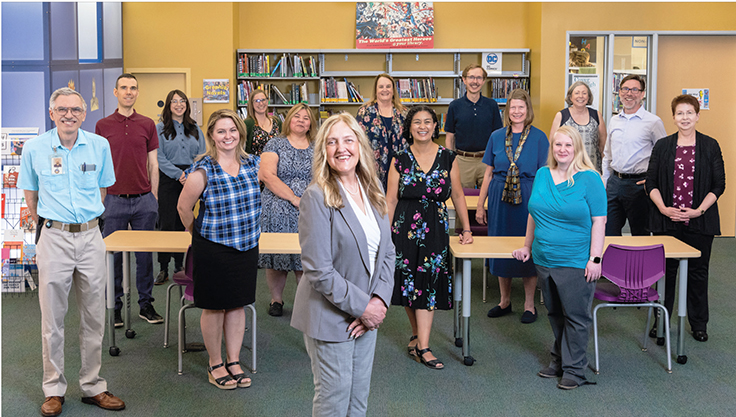 |
ALL-STAR CAST APL’s leadership team (l.–r.): Thomas Edelblute, Scott Fretwell, Chloe Van Stralendorff, Jennifer Beitler-Foxx, Emily Otis, Guadalupe Gomez, Audrey Lujan, Tasneem Watts, Nissa Perez-Montoya, Donald Hilliard Jr., Keely Hall, April Ray, Cynthia Hicks, Joe Purtell, and Jane Newell. Photo by David Zentz |
A WELCOME REBOOT
Near the end of 2019, APL identified the city’s immigrant neighborhoods, foster youth population, and active older adults as specific segments of the community it found “hard to reach.” Usership among those groups was low, and bringing them into the library presented challenges unique to each.
One of the first steps to reach these groups was to revise the library’s communication strategy, starting with its welcome brochure. The previous handout focused on rules, fines, and fees—not a welcoming message, especially to those who didn’t already use the library, or who don’t trust government institutions because they are undocumented immigrants or came from countries with dangerous regimes. The new brochure provides a privacy statement and includes information on programs and services, plus a statement promising to adapt them to support equitable outcomes for every Anaheim resident.
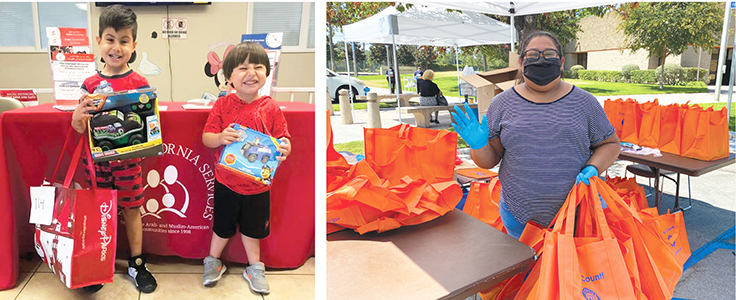 |
BOOKS TO KEEP l.-r.: Gifts for new Anaheim arrivals through AccessCal are a hit; APL staffer Cecilia Chavez distributes permanent loan books to seniors. Photos courtesy of Anaheim Public Library |
CONNECTING TO NEWCOMERS
At the beginning of 2020, APL opened the Citizenship Corner at Central Library and hosted a citizenship fair in early March, both open to all immigrants regardless of documentation status. The Citizenship Corner holds a collection of books with resources to help new immigrants with integration, job seeking, language skills, and other needs, plus a space for one-on-one legal counseling sessions. APL planned to conduct outreach that spring in a wide range of locations, from places of worship to grocery stores, until the pandemic forced a change of plans.
When Citizenship Corner services were suspended due to COVID, the library turned to its Arabic, Chinese, Farsi, Korean, and Vietnamese collections—first building ebook collections and then making sure print collections were contemporary, catalogued, and accessible. Local teens, required to earn service hours for school, have been instrumental in APL’s foreign language cataloguing efforts. Teen volunteers who spoke those languages worked from home to translate titles and book descriptions; they were given cover images to work from, and cataloguers could use the translations to create full bilingual records for every item in the non-English collections. Everyone has benefited. Although he initially signed on to “rack up some volunteer hours,” the work left Cypress High School senior Matthew In—a first-time volunteer—feeling empowered. “I really felt like I was doing a good thing for my community, and it made me feel good about myself,” he says.
APL will allocate funding for Arabic, Chinese, Farsi, Korean, and Vietnamese collections each fiscal year, and will continue bilingual cataloguing procedures to ensure these collections remain relevant and discoverable.
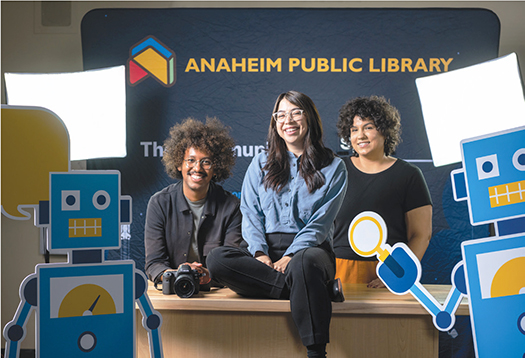 |
IN THE LOOP APL’s Communications Team (l.–r.): Byron Adams, Van Stralendorff, and Alessandra Gonzalez (not pictured: Anli Chen). Photo by David Zentz |
REACHING YOUTH IN FOSTER CARE
Lujan had long wanted to step up for youth in foster care or who are homeless or in other temporary living situations, as they often lack a permanent address or a parent or guardian who can sign for them when they apply for a library card. They are already coming from a situation where they may not have consistent access to an adult to advocate for them, she notes. “How are they going to have the benefit that another child has?”
APL revised its card policy to remove those barriers, reaching out for guidance to local organizations such as Court Appointed Special Advocates of Orange County (CASA OC), the Anaheim YMCA, Anaheim Independencia Family Resource Center, Manzanita Park Family Resource Center, Families and Communities Together (FaCT), and the Anaheim Union High School District (AUHSD) school counselors.
APL provided youth in foster care with free access to homework help and Wi-Fi, and in spring 2020 rolled out the We’re Here For You card for patrons 18 or younger who can’t obtain a parent or guardian signature or provide proof of current address. With the card they can check out up to five physical items, free of overdue fines and with assistance for lost items; it also offers full access to APL’s digital resources.
SERVING OLDER ADULTS
At the Sunkist branch, miles from Anaheim’s senior centers, getting older patrons to programs and services posed a challenge. Pre-pandemic, the library set out to create an accessible senior hub at Sunkist, with scheduled programming that included art classes taught by professional artists, computer classes, one-on-one tech counseling sessions with teen volunteers, and legal workshops for older adults on fraud protection and other issues, where they could connect with lawyers free of charge. The funding, partnerships, and programming were to set to begin in April 2020.
Those plans also changed. Instead, to serve seniors who were isolated or unable to interact with others during the pandemic, APL assembled art kits for curbside pickup, with instructions, links to online tutorials, and supplies to complete a project, plus encouragement to share finished work on social media. More than 1,400 were distributed during 2020. Computer classes and legal workshops were held on Zoom, where volunteers from Teens Teach Technology worked with older patrons to help get them up to speed, and the Orange County Council on Aging and Orange County Public Law Center offered legal information sessions.
Print materials on legal topics were distributed curbside and at city-run food distribution sites for older adults, along with Kindness Kits containing books, activities, and information about library and community services. Working with local organizations and assisted living facilities, APL was able to get Kindness Kits to older adults isolated at home, including some assisted living sites, depending on their safety guidelines. Many older adults felt afraid and isolated during the pandemic, says Principal Librarian Emily Otis, “and being able to participate in Zoom programs, or just to pick up an art kit and know that somebody had created something with them in mind, gave them so much peace of mind during the pandemic.”
 |
REACHING OUT (l.-r.): Lujan (l.) and donated gifts from the Foster Care Partnership with Bank of America; mobile Library outreach with resources and Wi-Fi. Left photo courtesy of Anaheim Public LIbrary; right photo by David Zentz |
COVID-19 CHANGES PLANS
When COVID-19 forced APL to close its facilities in March 2020, its entire service population suddenly became “hard to reach,” the library says. Moreover, because Anaheim is typically dependent on hotel taxes from visitors to Disneyland and the convention center, revenues dropped sharply; by December 2020 the city was looking at a shortfall of up to $114 million after federal aid, and APL was anticipating budget cuts. APL leadership knew it was more important than ever to stay in contact with all corners of the community to help users weather uncertainty, fear, hardship, and lack of connection—and to help staff do the same.
By Monday, March 23, 2020, staff got curbside service up and running at five locations. In the days that followed, the library transitioned to fully virtual programming, launched a campaign to promote online collections and databases, and established new partnerships to distribute materials people could keep, rather than borrow, at sites throughout the city. APL administration made safety a priority, working closely with the city’s Emergency Operations Center and investing $46,000 to purchase PPE and cleaning supplies; another $41,000 was spent on Plexiglas barriers, hand sanitizer stations, and safety signage. Returned materials were quarantined based on the REALM study.
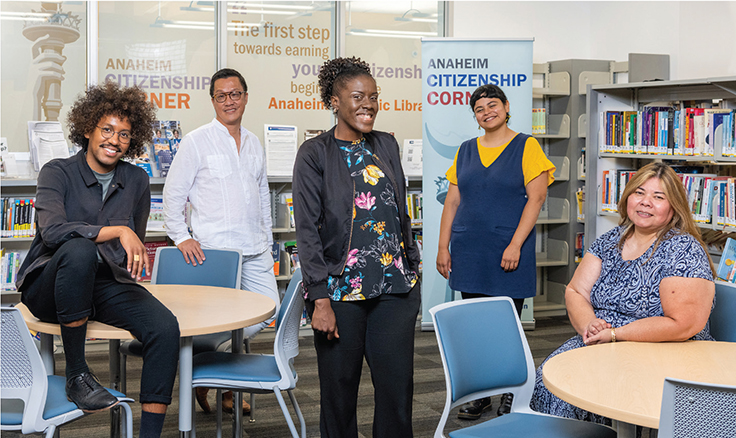 |
TOWARD DEEPER WORK APL’s Equity Team (l.-r.): Byron Adams, Tony Lam, Curita Tinker, Elise Bernal, and Guadalupe Gomez. Photo by David Zentz |
Cardholders could request library materials through the online catalogue or by phone. Rental and late fees were suspended for the duration of the pandemic. The library was also able to provide physical materials throughout the community thanks to strong partnerships. APL joined forces with AUHSD, the YMCA, and Grandma’s House of Hope, all of which, during COVID-19 school closures, served meals to the 77 percent of Anaheim students who relied on school lunches, plus their families. Library staff visited more than 90 of those food distribution sites, where they gave away nearly 68,000 “permanent loan” books for children and teens to keep, funded by monetary donations from library support groups, community service organizations, city and staff giving campaigns, and bequeathments to APL—some $57,000 since the beginning of the pandemic.
Ultimately, APL saw a budget reduction of $500,000 in 2020. Twenty percent of part-time hours were cut, but not a single employee was laid off or furloughed. “We very quickly found ways to make our programs work, to make our services work, even remotely,” recalls Otis. Those part-timers who needed to collect unemployment or take other work to supplement lost wages will be able to step back into their old positions when funding is restored.
“Audrey was firm to not lose anybody, and to take full advantage of everybody’s skills,” says Tasneem Watts, principal librarian and union representative for the Anaheim Municipal Employees Association. Lujan held discussions with staff at all levels to ask their safety concerns and brainstorm ways to help address them, including the option to move to locations where they felt more comfortable. “I think the best thing any organization can do is to have open conversations—not top-down, but from every staff member: part-time pages, clerks, technicians. And the pieces came together.”
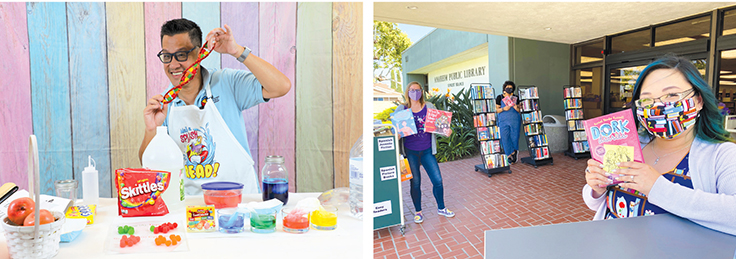 |
POP (UP) CULTURE (l.-r.): Staffer Tony Lam heads an Edible Science Program, part of the STEAM Adventures virtual program that took place Sept 2020; and a pop-up library at the Sunkist Branch during COVID. Photos courtesy of Anaheim Public Library |
GOING VIRTUAL
Programming staff were well prepared to embrace a virtual environment. Using the library’s video equipment and the production expertise of its communications department, APL launched its livestreamed story time on March 19; the first six virtual programs garnered 13,000 total views and reached 28,000 people. With that initial response, the library was able to secure funding for upgraded filming and editing equipment from the Samueli Foundation.
In addition to story times, APL’s virtual programming included DIY project tutorials, parent workshops, database instruction, and hands-on STEAM activities. APL’s Heritage Services staff launched virtual tours of the historic National Register structures at Founders’ Park for Anaheim Elementary School District’s 24 schools. At press time, APL has had more than 320,000 video views across Facebook, Instagram, and YouTube channels; virtual programs have reached more than 504,000 people, increasing threefold during the pandemic.
Staff noticed that families were gathering outside branches to use library Wi-Fi, particularly during school hours, so APL expanded Wi-Fi hours to 8 a.m.–10 p.m. A grant from the Samueli Foundation and support from the Mobile Family Resource Center Project helped APL outfit its Mobile Library to serve as a Wi-Fi hotspot in neighborhoods identified as high priority because of low internet access.
For school-aged children at home, grant- and donation-funded STEAM On the Go! kits offered hands-on learning. This year APL launched Expedition Live, a virtual program that enables classrooms, organizations, and families to book live STEAM programs led by library staff. Participants pick up materials from the library ahead of time, and then log on to Zoom for an interactive age-specific program.
APL also partnered with Anaheim’s Workforce Development Program to issue its registrants an APL card, which gives them access to library resources, including the California State Library JobNow database, Peterson’s test and career prep programs, and GALE courses to improve computer, writing, and other job-seeking skills.
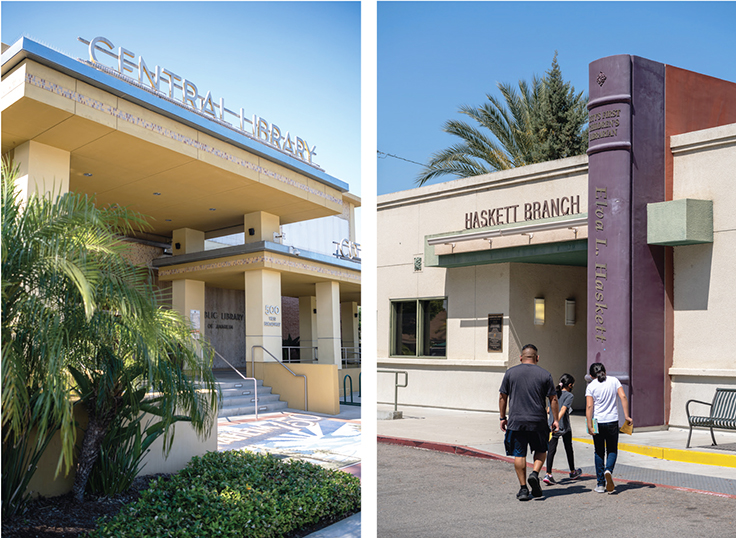 |
BRIGHT BRANCHES APL's Central Library (l.), and the Haskett Branch (r.) with its big book invites visitors in. Photos by David Zentz |
MAKING STRIDES FOR EQUITY
In 2019, APL applied for, and was accepted into, the California Libraries Cultivating Racial Equity and Inclusion Initiative (CREI). The initiative, part of the Government Alliance on Race and Equity (GARE), included intensive training on equity and inclusion for a group of staff, plus funds to share that training with the rest of the organization.
At the time, library leadership was interested in learning how APL could become more inclusive, with an emphasis on welcoming undocumented residents, refugees, and other marginalized groups so they would feel safe visiting the library. With Black Lives Matters protests taking place in summer 2020, and voices both in and out of the library speaking up to say that APL was falling short of its equity goals, they realized that deeper work needed to be done.
The library convened discussions where workers voiced concerns, and APL began a staffwide collaboration to better incorporate equity and inclusion into its work. Equity training for all under the CREI initiative began that summer; this included a presentation on the history of inequity in Anaheim, and bias and privilege tests enabling staff to look critically at their underlying beliefs and unconscious actions.
Major issues identified included APL’s hiring process, and a lack of people of color and LGBTQIA+ people in higher-level jobs. The library is currently in a hiring freeze, but discussions led to recruitment ideas to be implemented when hiring resumes, and APL will host career workshops and include recruitment awareness in its outreach.
The discussions also led to the creation of virtual programming to drive community awareness and conversation and celebrate Indigenous, Asian, Black, and Latinx cultures and LGBTQIA+ pride. APL is participating in the California Center for the Book’s Book to Action program; staff will share hundreds of copies of this year’s selection, Ibram X. Kendi’s How To Be an Antiracist, in English and Spanish.
In spring 2020, the library launched a systemwide diversity audit of the teen fiction collection. Staff reviewed the range of experiences or identities represented in each book, considering the cover, summary, and author information, along with subject headings. Results will be compared to demographic data for the city and AUHSD to help identify gaps in the collection. The audit will also populate a searchable readers’ advisory database that staff can use to help connect teens with books.
OUTREACH BY ALL
Even in a time of citywide budget contractions, APL was able to find support not only from APL’s Friends and foundation, but from community partners, including Anaheim’s school districts, Kiwanis Club of Greater Anaheim, and national and local funders. APL encourages all staff members to reach out and build relationships with organizations and people—helping the library stay on top of what’s happening in the city, and who might be the best partners for a given initiative. “My philosophy basically is, every idea is a good idea,” says Lujan.
“We don’t have one outreach librarian. Anybody at any level is empowered to connect with community organizations,” says Otis. “It’s personal, and it feels kind of grassroots. Every one of us is a face for Anaheim Public Library, and we’re all cultivating different relationships that then build this really strong network throughout the city.”
A prime example is APL’s work with Access California, a local organization that assists refugees and immigrants. The library, which often receives corporate donations from the Walt Disney Company, gave AccessCal more than 3,300 items of clothing, toys, and grant-funded school supplies. AccessCal, in turn, helps APL reach immigrant communities by sharing information about programs and services in email newsletters and print ads. Library card sign-up information is currently being added to AccessCal’s enrollment forms, so new residents can automatically apply.
“During the pandemic, we looked to APL as a leader and role model,” says an AccessCal leadership team member. “APL responded in a profound, equitable, and creative way to the populations we serve.”
In December, the library partnered with CASA OC for its annual gift drive for youth in foster care. APL coordinated donations from city employees in all departments through its Friends and foundation and Anaheim’s annual giving campaign. The Bank of America donated more than $3,000 worth of clothing, toys, gift cards, and appliances. APL donated 500 art books and 400 coloring books from Disney to incarcerated teens through the Orange County Probation Department, which led to a similar opportunity with the Children’s Hospital of Orange County’s mental health inpatient unit.
As branches reopen, community engagement is high, and staff morale solid. In October 2020, Central Library reopened at reduced capacity, followed by the Haskett and Canyon Hills branches in November, with no traceable cases of COVID-19 and few conflicts over safety precautions. “People who are coming to the library want to be here,” says Otis. “They’re respecting staff because they value the library.” The Euclid and Sunkist branches reopened on June 1 with reduced hours, including an outdoor pop-up library near a local school, and limited mobile services have resumed.
“I think everybody feels fairly safe,” says Watts. “We all helped to work at [the opened] locations, with Plexiglas and masks and gloves and whatever cleaning supplies you need. They were abundant.”
All credit for the library’s resourceful work during the pandemic and as it reopens, says Lujan, rests with APL workers. “A library administrator can’t create what APL has done sitting in an office,” she adds. “The way we transitioned in those six days from March 16 to March 23, and kept going through COVID, is a tribute to every one of my 180 staff members.”
LIBRARY OF THE YEAR 2021 HONORABLE MENTIONS
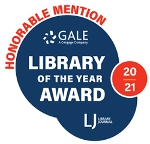 LOUDOUN COUNTY PUBLIC LIBRARY, LEESBURG, VA
LOUDOUN COUNTY PUBLIC LIBRARY, LEESBURG, VA
CHANG LIU l LIBRARY DIRECTOR
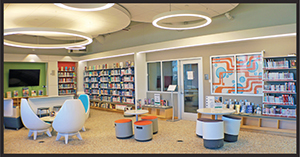 During the worst of the pandemic, Loudoun County Public Library (LCPL) made it its mission to keep people connected, not just to the library, but to one another. Outreach Services Manager Patricia Pacheco invited patrons to send valentines to seniors. They wrote 3,763, enough for every senior served by Outreach Services. Branches created Gratitude Walls and ran Take, Make, and Return community projects such as blankets for an animal shelter.
During the worst of the pandemic, Loudoun County Public Library (LCPL) made it its mission to keep people connected, not just to the library, but to one another. Outreach Services Manager Patricia Pacheco invited patrons to send valentines to seniors. They wrote 3,763, enough for every senior served by Outreach Services. Branches created Gratitude Walls and ran Take, Make, and Return community projects such as blankets for an animal shelter.
LCPL also responded to pandemic restrictions by creating virtual programs (which garnered 52,758 hours of views), boosting Wi-Fi to parking lots (usage increased by 51 percent), expanding access to digital resources, and offering curbside service. iPad lending helped patrons without internet access. And an innovative Teen Subscription Box service sends monthly personally curated books and more. When branches reopened, LCPL turned to contact-free programming such as StoryWalks, scavenger hunts, and I Spy boards.
To improve equity internally, LCPL sponsored staff members from underrepresented groups to participate in the Leadership Loudoun program and launched a platform that educates staff on topics including diversity training and service to unhoused patrons. Staff are encouraged to take mental health days. To advance inclusion in the community, staff conducts outreach to local LGBTQIA+ groups (including making reading lists for the first middle-school Pride Club in the area), and created a book club for neurodivergent teens. Programs address voting rights, mental illness, disability, race and ethnicity, and more. Importantly, the library doesn’t shy away from bringing these topics home: an author talk addressed Loudoun’s desegregation movement, including the effort to desegregate the libraries.—Meredith Schwartz
 SACRAMENTO PUBLIC LIBRARY, CA
SACRAMENTO PUBLIC LIBRARY, CA
RIVKAH SASS l LIBRARY DIRECTOR
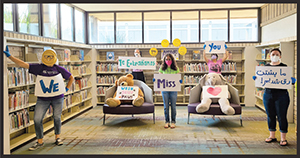 Since Sacramento Public Library (SPL) won LJ’s Jerry Kline Community Impact Prize in 2019, it has built on its successes and tackled 2020’s unique challenges.
Since Sacramento Public Library (SPL) won LJ’s Jerry Kline Community Impact Prize in 2019, it has built on its successes and tackled 2020’s unique challenges.
The team took its use of Harwood conversations to the next level with Local Voices Network, spurring SPL to build out branch-specific services such as homework help in Vietnamese, and trained other libraries on its innovative accessibility and COVID-19 safety plans.
With in-person outreach sidelined, bilingual census phone banking led to 15,755 calls, driving a 4.2 percent increased response rate. Curbside ballot boxes monitored by volunteers and staff, plus drive through collection, gathered nearly a quarter of the county’s ballots.
After COVID-19 shut down its braches, SPL launched 32 new virtual programs and services, increased digital checkouts by 23 percent, and added 42,356 new digital cardholders. SPL partnered with the county to deliver virtual early learning workshops, supported distance teachers, and supplied free books.
The Central Library served as a cooling, clean air, and warming center. A partnership with the Great Plates Delivered Initiative provided meals for older adults. Port-a-potties outside closed branches served people there to use the boosted Wi-Fi. SPL partnered with the city and others to host community hotspots with Wi-Fi buses and offered one year of free internet service to eligible residents.
SPL’s Equity, Diversity, and Inclusion Team (EDIT) provides guidance, tools, and training; selects and promotes relevant collections; and develops new services. Management uses tools from the Government Alliance on Race and Equity to develop an equity statement and review services, programs, and policies. Concrete steps include a hiring process that redacts identifying information that could result in bias-based decisions, 5 percent additional pay for bilingual employees, new bilingual outreach librarian positions, management drop-in hours, and a way for staff to give anonymous feedback. Inside the organization and out, SPL is committed to listening and using that input to drive needed change.—Meredith Schwartz
LIBRARY OF THE YEAR 2021 JUDGES
LJ thanks the following individuals who volunteered their valuable time to help select the 2021 Library of the Year:
RICHARD ASHBY l Director, FOR Sto-Rox Public Library, McKees Rocks, PA; Immediate Past President, Black Caucus of the American Library Association (ALA)
WANDA KAY BROWN l Director of Library Services, C.G. O’Kelly Library, Winston-Salem State University, NC; Immediate Past President, ALA
ANNE CISNEY l Reference Librarian, AFSCME Local 2083 Union President, Seattle Public Library, 2020 Library of the Year
RAE-ANNE MONTAGUE l Library and Information Science Faculty & Program Coordinator, Chicago State University; Chair, Rainbow Roundtable, ALA
JENNIFER PEARSON l Director, Marshall County Memorial Library, Lewisburg, TN; Past President, Association for Rural and Small Libraries
Gale’s vote was determined by a volunteer committee comprised of members of the company’s Employee Resource Groups: MELISSA BOWEN, Gale Pride Team Member; RACHAEL HINOJOSA, Gale Pride Site Lead; and GINA JACKSON, Gale Mosaic Team Member.
The panel also includes LJ’s MATT ENIS, LISA PEET, and MEREDITH SCHWARTZ
 LJ editor panelists select up to six finalists from among the entries and invite external judges to participate, including one vote from Gale, the award’s sponsor. Each vote is given equal weight. After consultation together, the judges choose their first-, second-, and third-place candidates and convey their votes to the coordinating LJ editor. Each vote is assigned a corresponding point value. The cumulative totals determine each year’s award winner and honorable mentions; any ties are broken by LJ editors. Note: The award guidelines and makeup of the judging panel were revised this year to include a broader range of voices; more details can be found at LJ's Library of the Year Guidelines.
LJ editor panelists select up to six finalists from among the entries and invite external judges to participate, including one vote from Gale, the award’s sponsor. Each vote is given equal weight. After consultation together, the judges choose their first-, second-, and third-place candidates and convey their votes to the coordinating LJ editor. Each vote is assigned a corresponding point value. The cumulative totals determine each year’s award winner and honorable mentions; any ties are broken by LJ editors. Note: The award guidelines and makeup of the judging panel were revised this year to include a broader range of voices; more details can be found at LJ's Library of the Year Guidelines.
On July 27, join Anaheim Public Library, along with the honorable mention libraries, (Loudoun County Public Library, VA and Sacramento Public Library, CA), for a webcast, Learning with the Library of the Year. Panelists, moderated by LJ Editor-in-Chief Meredith Schwartz, will examine the transformation libraries have experienced in recent years, and the roles equity and workforce support play.
RELATED
ALREADY A SUBSCRIBER? LOG IN
We are currently offering this content for free. Sign up now to activate your personal profile, where you can save articles for future viewing









Add Comment :-
Comment Policy:
Comment should not be empty !!!